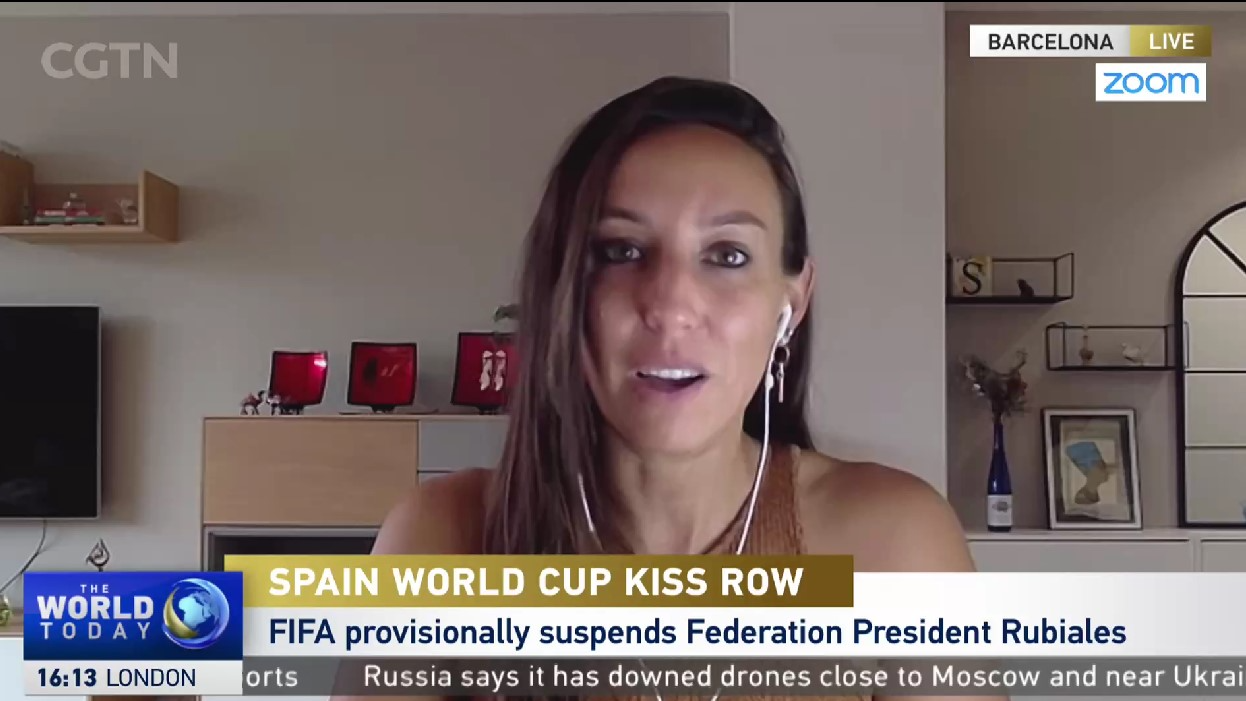07:09

WATCH: Semra Hunter on the 'kiss' saga and its seismic impact in Spain
Spanish football seems to be facing a monumental moment of reckoning.
"We're really on the brink of something very major here as it comes to a cultural and societal shift," Semra Hunter, a Spanish Football broadcast journalist, tells CGTN.
The Royal Spanish Football Federation - one of the country's most esteemed organizations, has found itself embroiled in legal proceedings, a wave of high profile resignations and a massive online backlash about attitudes towards the treatment of women - all in the space of one week.
A contentious kiss is at the heart of the controversy involving the football body's highly influential president and former player, Luis Rubiales, and allegations he gave Jennifer Hermoso an unwanted kiss on the lips after Spain's La Roja sealed a World Cup victory in Australia on August 20.
READ MORE
Spanish football federation taking legal action; Rubiales suspended
12 times less pay: Women's football in Spain fights for equality
The world football governing body FIFA has suspended Rubiales. He is banned from all football-related activities for three months pending an investigation. An internal investigation was launched by Spain's football federation on Sunday after its sexual violence protocol was activated.
Rubiales has defiantly refused to heed calls to step down, instead vowing to fight "false feminists" who are "trying to kill me" in a "witch hunt." He maintains the kiss was consensual, saying it was "spontaneous, mutual, euphoric and with consent."
Hermoso refutes this, arguing she felt "vulnerable and the victim of an aggression."

Jennifer Hermoso, with Rubiales after Spain's World Cup victory, insisted the kiss was not consensual / Hannah Mckay/Reuters
Jennifer Hermoso, with Rubiales after Spain's World Cup victory, insisted the kiss was not consensual / Hannah Mckay/Reuters
Isolated incident or symptom of systematic attitudes towards women?
"There is a problem with sexism, with misogyny, with 'machismo', as they call it in Spain," Semra adds. "It does exist, and unfortunately, it's been very normalized for far too long."
Gender issues have been a rampant talking point in Spain in recent years. Tens of thousands of women have taken part in street marches protesting against sexual abuse and violence, and the Socialist-led coalition government has presided over legal reforms including issues of equal pay and abortion rights.
"Women have had to put up with a lot of abuse, with mistreatment, with being ridiculed, with being humiliated, always having to turn the other way and letting men in powerful positions get away with it. We've seen this in all spheres of society here in Spain," says Semra.
The current fallout in the country's most beloved sport has catalyzed a deluge of social media activism. Players from the Spanish women's football team took to X, formerly Twitter, with the hashtag #SeAcabó, or it's over - proclaiming it's time for change.

Jennifer Hermoso celebrates after winning the World Cup in Australia /Amanda Perobelli/Reuters
Jennifer Hermoso celebrates after winning the World Cup in Australia /Amanda Perobelli/Reuters
On Saturday, the entire women's coaching team stepped down, with exception to head coach Jorge Vilda, who up until that point, had remained silent. He was spotted applauding Rubiales in his rebellious speech to the federation on Friday.
Vilda eventually released a statement to Spanish news outlets on Saturday, saying he was deeply sorry "the victory of Spanish women's football team has been harmed by the inappropriate behavior that our until now top manager, Luis Rubiales."
The pressure is mounting from all levels on Rubiales.
Spainsh Prime Minister Pedro Sánchez said the apology for what he called an "unacceptable gesture” was not enough. The country's acting Labor Minister Yolanda Diaz wrote on social media, "Impunity for macho actions is over. Rubiales cannot continue in office." Meanwhile, the head of Spain's state-run National Sports Council said the government supported FIFA's decision.

Protests against Spanish football president Luis Rubiales outside the Federation's building in Las Rozas, Spain /Isabel Infantes/Reuters
Protests against Spanish football president Luis Rubiales outside the Federation's building in Las Rozas, Spain /Isabel Infantes/Reuters
Where does this take Spanish football?
According to Semra, "this war" has sparked promise.
"I want to believe with everything that I'm witnessing, that there is hope of a better future - that for once, this situation, these women, they are being taken seriously," she says.
In the meantime, she believes Rubiales is buying time until he is eventually pushed out. She sees victory for Spanish women and shifting attitudes towards female players once "publicly ridiculed as capricious little girls" when they spoke out against sexism.
"The fact that there is a bit of a clear out here does mean that there is an opportunity for new people to come in, right the wrongs and establish a new organization and do things the proper way.
"I do think there is reason to believe that there is a brighter future and that for once it will get the proper attention and care that it deserves here in Spain."
Subscribe to Storyboard: A weekly newsletter bringing you the best of CGTN every Friday
Source(s): Reuters